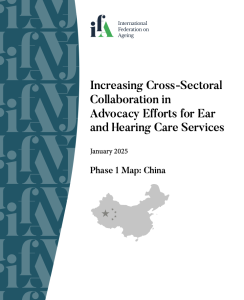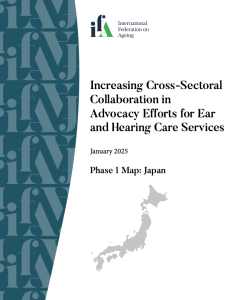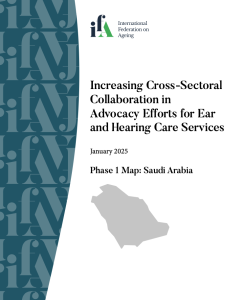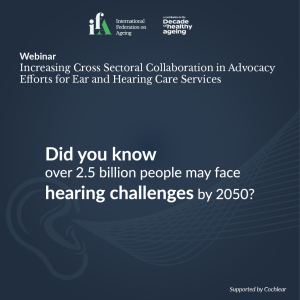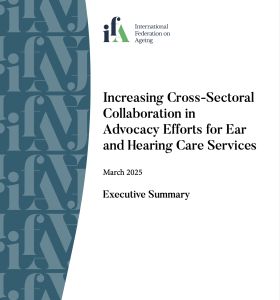Increasing Cross Sectoral Collaboration in Advocacy Efforts for Ear and Hearing Care Services

Population ageing is a rapid global phenomenon that has profound implications for all aspects of health and well-being as well as health systems development and sustainability. By 60 years of age, the major burdens of disability and death arise from declines in function as well as non-communicable diseases (NCDs).To enable well-being with ageing and to decrease health system costs, it is imperative to develop public health responses that focus on developing and maintaining intrinsic capacity and functional ability across the life course.The United Nations (UN) Decade of Healthy Ageing calls for environments that foster healthy ageing and help to maintain and improve functional ability, including hearing health in later life.
As reported by the WHO World Report on Hearing, globally, more than 1.5 billion people experience some degree of hearing loss, which translates to about 1 in 5 people, worldwide. By 2050, this number is anticipated to grow by 60% to 2.5 billion, which means that 1 in 4 people will experience hearing complications. This trend parallels the rapidly ageing global population. By 2050, the projected number of persons aged 60 years and older will double to 2.1 billion people, and the subpopulation of those aged 80 years and older is expected to triple to an estimated 426 million individuals.
Research has also demonstrated between a link between dementia and hearing loss. A study by Dr Lin and colleagues demonstrated that mild hearing loss doubled dementia risks, moderate loss tripled risks, and people with severe hearing impairment were five times more likely to develop dementia.
This intersection underscores the urgent need to address hearing loss in a more holistic way. As we navigate these intertwined challenges, it becomes increasingly clear that concerted efforts to prioritize hearing health are essential not only for individual well-being but also for the broader resilience and sustainability of healthcare systems in an ageing world.
Guest Speakers
Dr. Kathy Pichora-Fuller
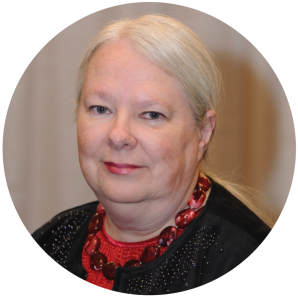
Dr. Kathy Pichora-Fuller, PhD, Professor Emerita of Psychology at the University of Toronto and Adjunct Professor of Gerontology at Simon Fraser University
Dr. Kathy Pichora-Fuller is Professor Emerita (Psychology, University of Toronto) and Adjunct Professor (Gerontology, Simon Fraser University) in Canada. She was a faculty member in the School of Audiology and Speech Sciences at the University of British Columbia (1992-2002). For over three decades, she has translated her research on auditory and cognitive aging to address the rehabilitative needs of older adults with age-related hearing and cognitive impairments, with a more recent focus on social engagement and healthy aging, including promoting brain health. She started the International Society of Audiology “Hearing in Later Life” Working Group in 2023. Currently, she is Past President of the International Collegium of Rehabilitative Audiologists (ICRA) and is the ICRA representative on the WHO World Hearing Forum. She represents the International Society of Audiology on the World Rehabilitation Alliance working group on primary care and serves. She became the Chair of the Bowen Island Municipality Accessibility Advisory Committee in 2023.
Dr. Joshua Chodosh
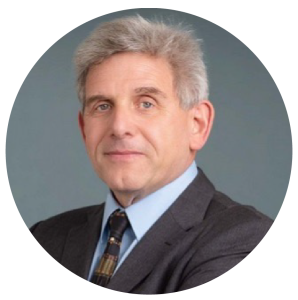
Dr. Joshua Chodosh, Clinical Geriatrician and Professor of Medicine and Population Health at NYU Langone Health and NYU Grossman School of Medicine
Dr. Chodosh is a clinical geriatrician and professor of medicine and population health at NYU Langone Health and NYU Grossman School of Medicine. He is Director of the NYU Division of Geriatric Medicine and Palliative Care and the inaugural endowed Michael L. Freedman Professor of Geriatric Research at NYU Grossman School of Medicine. He is also the Deputy Director for clinical translation in the recently launched NYU Optimal Aging Institute and he leads the Outreach, Recruitment and Engagement Core of the NYU Alzheimer’s Disease Research Center. Dr. Chodosh built the Freedman Research Center on Aging, Technology and Cognitive Health and his research focuses primarily on dementia, other functional impairments and hearing health care services. Dr. Chodosh leads multiple NIH and VA clinical trials and health services studies and is PI of the United States Centers for Disease Control and Prevention (CDC) BOLD Public Health Center of Excellence on Early Detection of Dementia.
Dr. Sue Archbold
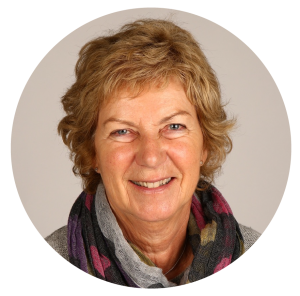
Dr. Sue Archbold, Co-Ordinator of the CI International Community of Action, CIICA
Following a career as a teacher of the deaf, Sue Archbold managed the Nottingham CI Programme from its inception in 1989 until 2004. During this time she published widely on outcomes from pediatric implantation, including cost-benefit analyses. Following this, she became CEO of The Ear Foundation, leading a team of support, research, education and services for CI users of all ages and their families. Sue has published and lectured widely on this work, focussing on CI benefits and challenges in real life, and using research to influence policy and practice. She gained her PhD, cum laude, from Nijmegen University on Deaf Education: Changed by cochlear Implantation? She was honoured with an Hon Doctor of Letters by Nottingham University, her alma mater. With her colleague, Brian Lamb, she has published globally used reports on the impact of deafness and hearing loss and of Cochlear Implants. She is now the Co-Ordinator of the CI International Community of Action, CIICA, and works with WHO on the Steering Committee of the World Hearing Forum. Sue remains passionate about improving access to the best possible services for all who are deaf or have hearing loss.

